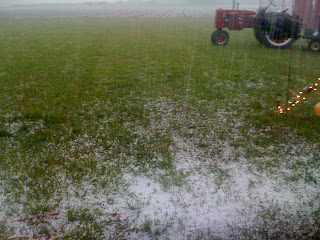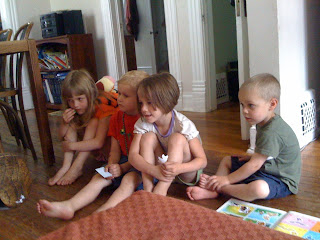Not long ago, I decided to start a blog with a friend and called it, "Everything is Terrifying!" The idea started after he spent a whole morning drinking caffeine and reading frightening New York Times articles about E. coli and various toxins that we ingest daily. I arrived in the middle of his heightened state of environmental worry, ringing the doorbell. Having not yet figured out the buzzer system, he ran down from the third floor and threw the door open, eyes wide and breathing heavily:
"Garrett," he gasped, "Everything is Terrifying!"
Growing up, we become increasingly aware of the horrors of the world. I'm not trying to be dramatic, it's how I remember it and how I have observed it in others. We are introduced to various disturbing things as we grow up, slowly coming to terms with the things we don't understand. War is the easiest example because no one understands war. If you want to see a really good illustration of how no one really understands war, watch the documentary The Fog of War: Eleven Lessons from the Life of Robert S. McNamara. The title, Fog of War, is enough, for now, to illustrate what I mean. Defining the purpose or consequences of a single war is like trying to define the ocean; it doesn't matter what angle you approach it from, you will never understand it's vastness or depth, let alone explain it in tangible terms to the youngster who asks naive question.
When I was a young teenager, I asked Grandpa how many people he killed in World War 2. That's probably not true. My guilt over past naivety has rearranged my memory. I probably asked him something more like: "Do you know how many planes you shot down?" To which he replied that it was difficult to tell because at any given point several other gunners would have been shooting at the same plane. In this case, I can say that I am grateful for the fog of war, the chaos that makes ethical parameters shake like panes of glass in a hurricane.
I've talked to a lot of people now about how there is a trendiness right now in the attempt to recapture the innocence of youth. Childhood innocence certainly seems attractive when I think about violence on the news, on the streets of Chicago or in far off countries that I don't have the luxury of considering "far off". The truth is, that childhood innocence in adults is dangerous and the pursuit of it is mainly valuable as an artistic contrast to reality. I prefer some level of awareness, no matter the terror, and feel that the more accurate my big picture gets, the better equipped I am to deal with life as it comes at me.
The problem with that mentality is that the world never stops coming and I have to step back and breathe occasionally when my mind becomes too entangled in the problems I would like to tackle. In addition, for me, this overwhelmed state of powerlessness is brought about too easily, too quickly. For example, I have read a number of convincing articles about how vegetarianism (or some level of mindfulness in the selection meats) is necessary because of the state of the slaughterhouses and the food industry in general. I don't need to watch Food, inc to understand that I should stay away from boneless chicken wings, but I still eat them sometimes because I'm perpetually stuck between a desire to eat meat and a demoralizing sense that I really can't make a difference by changing my eating habits.
While I slowly work through that particular issue, my life decisions regarding career future surround me. The frequent biblical references to "gnashing of teeth" always made me laugh, but secretly gave me mental images of sharp teeth and raspy voices challenging me. So, now my inner voices challenge me to justify my path.
I'm off to study Literature at a Research University. While the atmosphere of a Research University appears perfect for Graduate studies, I am painfully aware that it is probably not where I want to teach. As a professor, I imagine myself more interested in teaching than research. I invested a lot of myself into my college experience and so much of me has been influenced by that experience. From the first professor's rant that the whole class's papers were "a steaming pile of excrement" to being locked in an elevator with my least favorite professor threatening me, I have had my share of negative experiences. Through various inspiring examples, however, I have come to admire the profession and the responsibility that is put on these individuals to shape the future. That's why I'm excited to start my Freshman Year Composition class in my second year at Notre Dame when many of my classmates will want to be over before it begins. I'm excited by the opportunity to be an example to others because nothing is more motivating for me than knowing that I can really make a difference in that person's life. As short as it may be, the hope to use my time with my students so that it is a thousand times more significant than adjusting my diet or holding a sign at a rally.



































